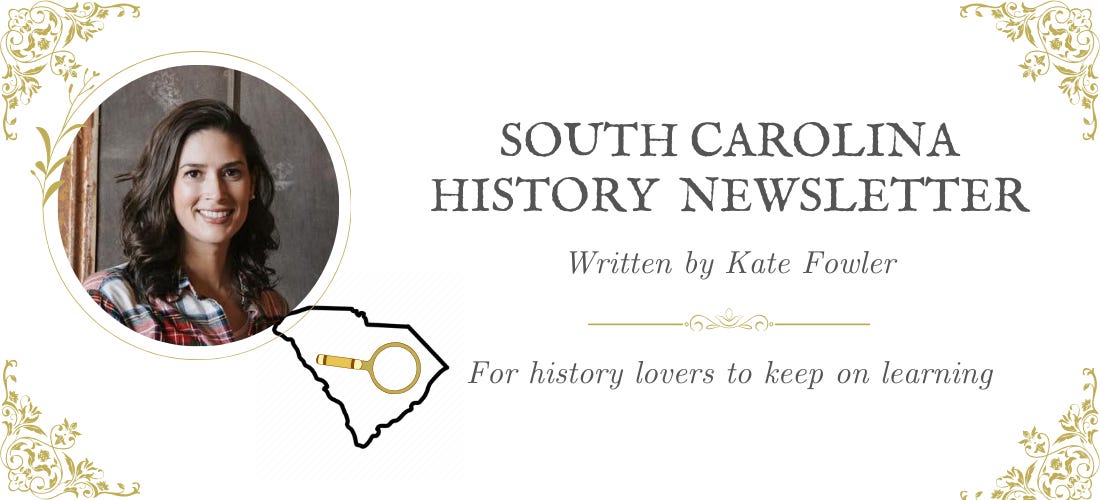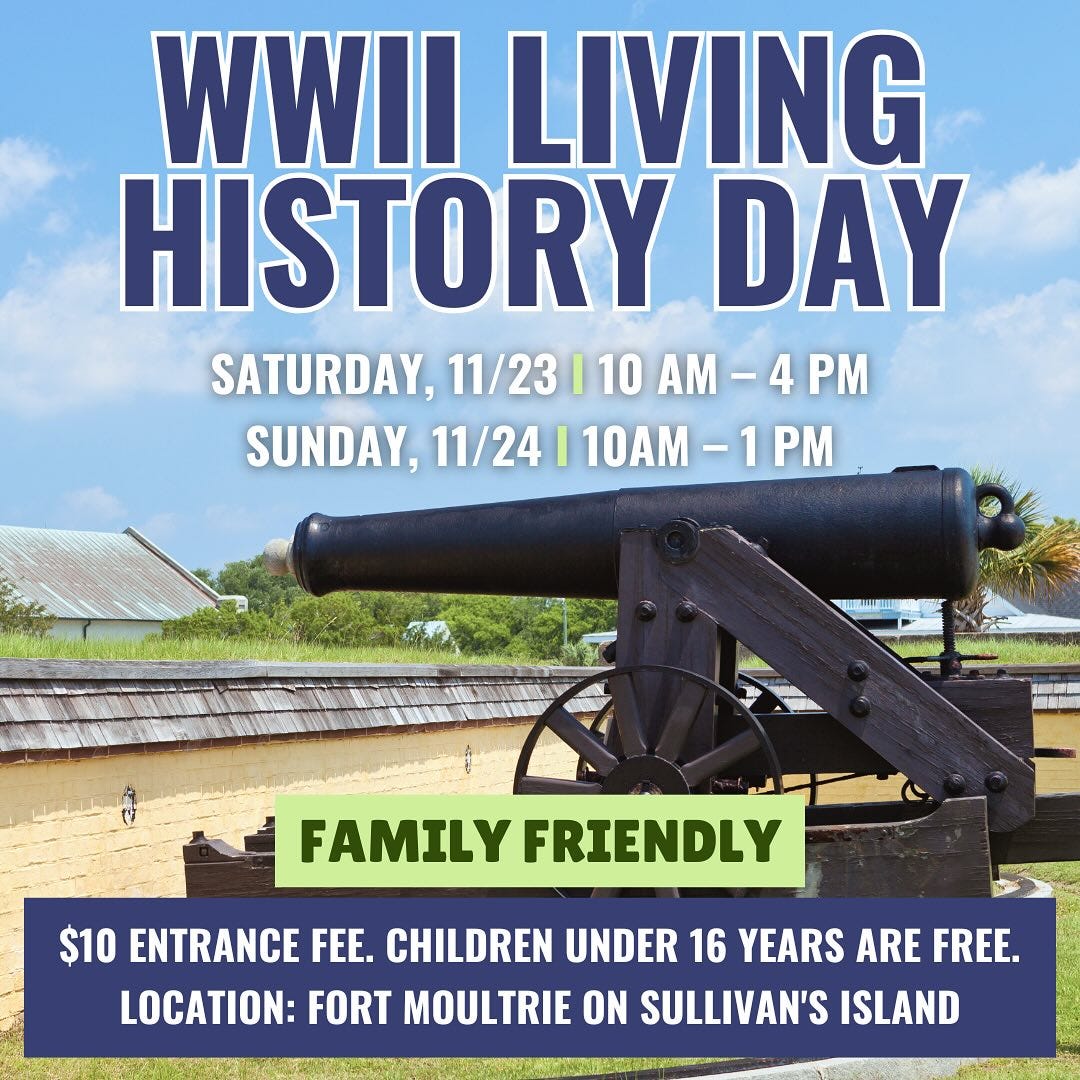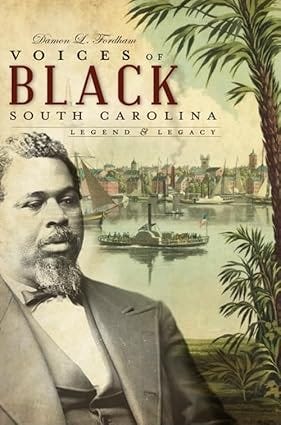#123: The First Thanksgiving(s) in South Carolina, WWII Living History Day, and Voices of Black South Carolina
For South Carolina history lovers far and wide! Published weekly on Monday mornings. Enjoy weekly SC history articles, interviews w/ experts, book recommendations, and upcoming SC historical events.
Dear reader,
Welcome to SC History Newsletter #123!
By the time you receive this email, I will be with my family in… sunny Sicily!
I have Sicilian heritage on my father’s side of the family and have not been back to visit relatives there since I was a teenager. Now, I venture there, over the ocean, with my wonderful husband and sweet stepson (age 12)! We will celebrate Thanksgiving in Italy!
Of course this week, I felt compelled to delve into the history of Thanksgiving in South Carolina. Where did the holiday come from? When did it first occur in the colony? I think you’ll be intrigued by the history, as I was.
As the Thanksgiving holiday approaches, I’d like to give thanks to YOU, my amazing readers for your support of the SC History Newsletter. I hope you have a wonderful holiday with your friends and family. I hope you make many new memories and enjoy much delicious food!
Sending best wishes from Sicily!
New friends! If you are new to the newsletter, please note that there are over 100 previous SC History newsletters on topics ranging from the founding of Charleston, sunken Confederate submarines, railroad tunnels filled with blue cheese, and so much more! I encourage you to take a look at our archive here.
Send me your topic ideas: I love it when subscribers write to me! Have a SC History topic or question you’d like for me to write about? Just reply to this email and let me know!
Join us on social: Please join us & keep the conversation going by becoming a member of our SC History Newsletter Facebook Community here! I can’t wait to meet you. :)
If your email “cuts off”: In your email app or website, if my emails “cut off” for you, please click the title of the email and it will take you to the full post on the Substack. I don’t want you to miss any content!
And now, let’s learn some South Carolina history!
Yours truly,
Kate
(Writing from Greenville, SC)
➳ Featured SC History Events
Please note our featured SC History Event below, and click here to visit my SC History Events Calendar that organizes all the upcoming SC history events I have discovered.
Please let me know if you’d like to add an event to the calendar! Reply to this email to send me your events.
Event Recommendation of the Week:
Saturday, November 23 - Sunday, November 24 | “WWII Living History Day” | Fort Moultrie on Sullivan’s Island, SC | Website
“Mark your calendars for WWII Living History Weekend at Fort Moultrie! Come experience the typical WWII army garrison of the home front. Living history demonstrations will showcase Weapons Training, Signal Corps, the Women’s Army Corp (WAC), and Military Police of the 1940s.”
➳ SC History Book, Article, & Movie Recommendations
“Voices of Black South Carolina” by Damon L. Fordham
Publisher’s description:
“Discover the contributions notable Black South Carolinians gave to bring encouragement and inspiration to their communities.
Did you know that eighty-eight years before Rosa Parks's historic protest, a courageous black woman in Charleston kept her seat on a segregated streetcar?
What about Robert Smalls, who steered a Confederate warship into Union waters, freeing himself and some of his family, and later served in the South Carolina state legislature?
In this inspiring collection, historian Damon L. Fordham relates story after story of notable black South Carolinians, many of whose contributions to the state's history have not been brought to light until now. From the letters of black soldiers during the Civil War to the impassioned pleas by students of "Munro's School" for their right to an education, these are the voices of protest and dissent, the voices of hope and encouragement and the voices of progress.”
Have you read this book? Tell us your review! Leave a comment below!
➳ SC History Topic of the Week:
When was the first Thanksgiving in South Carolina?
To answer this question, first we must begin by establishing that our modern day view of Thanksgiving is that it is — for the most part — a secular holiday. However, the roots of Thanksgiving are “firmly rooted in the religious practices of the European men and women who crossed the Atlantic Ocean to settle this nation.”
Settlers to the New World who came from England, France, Spain, Germany, Portugal (and many other European countries!) were accustomed to living in cultures where their ruler or “commander-in-chief” would issue a proclamation for a specific “holy day” or “holiday” (Note from Kate: Wow! I never knew the origin of this word!) for quiet reflection. The people would be urged to spend their holy day in prayer.
In early America, there were 2 different types of holy days. One type of holy day would occur after a “disaster or unfortunate event, such as an epidemic, a destructive hurricane or fire, an earthquake, or a military defeat,” and was typically called a “day of fasting and humiliation.”
The other type of holy day was called a “day of prayer and thanksgiving” which would be proclaimed after good news “such as a military victory, a quiet hurricane season, or a bountiful harvest.”
Annual days of “thanksgiving” were “international practice” in the Age of Discovery and they existed long before the Pilgrims of early Massachusetts.
Charleston historian Dr. Nic Butler shares that the earliest recordings of thanksgiving in the New World were:
Early 1500s — Spanish explorers in the Americas celebrated an annual day of thanksgiving.
1564 — French adventurers who settled briefly at Parris Island, South Carolina, celebrated a day of thanksgiving.
1607 — English settlers at Jamestown, Virginia held a day of thanksgiving after their safe arrival.
While per above, the French celebrated a day of thanksgiving in 1564 on Parris Island, when did the first English settlers celebrate their first day of thanksgiving in the Carolina colony (it was officially named South Carolina in 1710)? The first English settlers arrived at Charles Towne in 1670 on the west bank of the Ashley River. Dr. Nic Butler explains that due to lack of records from this time period, he was unable to assess when the very first day of thanksgiving may have been, but he writes, “I’d wager that the first English settlers who arrived at Charleston in the late spring of 1670 celebrated a day of thanksgiving before the end of that year.” Butler cites that the settlers would have been too busy for a holy day in those beginning months of the colony, when surely, they were hard at work building shelters, planting crops, and braving the elements of the new land.

While Dr. Butler believes there would have been many opportunities for days of thanksgiving throughout the decades after 1670, he shares in his research that the first recorded observance of a public thanksgiving in South Carolina occurred on October 17, 1706, “which was approximately six weeks after our militia forces defeated an invasion force of Spanish and French soldiers from St. Augustine, Florida.”
The Reverand Francis LeJau, a missionary from England who arrived in Charleston on October 18th, 1706, noted in a letter:
“Upon my first Landing I saw the Inhabitants rejoycing: they had kept the day before holy for a thanksgiving to Almighty God for being safely delivered from an Invasion from the French and Spaniards.”
In the ensuing history of the South Carolina colony, there would have been many days of thanksgiving, though not all of them are saved in the public record. We do know that days of thanksgiving did generally occur after military victories. For example, we know for sure that Charleston as a city gave thanks for the British victory of the French on Cape Breton Island (siege of the Louisburg fortress) in 1745, and in 1776, Charleston gave thanks for the American victory over the British at Sullivan’s Island.
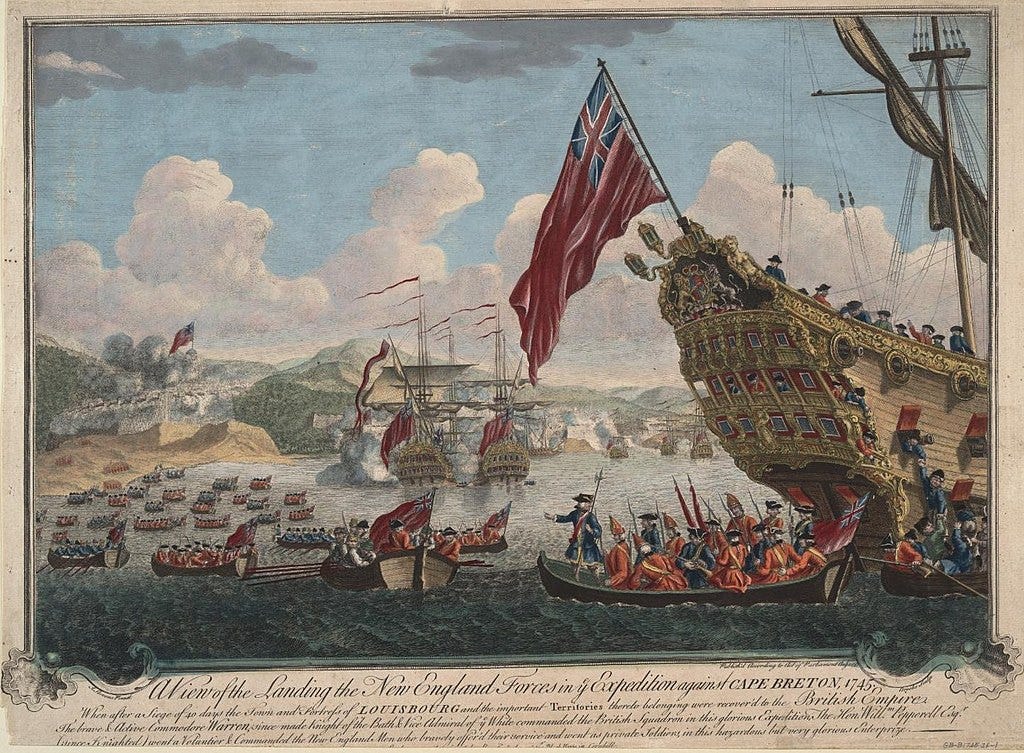
If there was an event that impacted the whole community, it is likely there was a day of thanksgiving proclaimed.
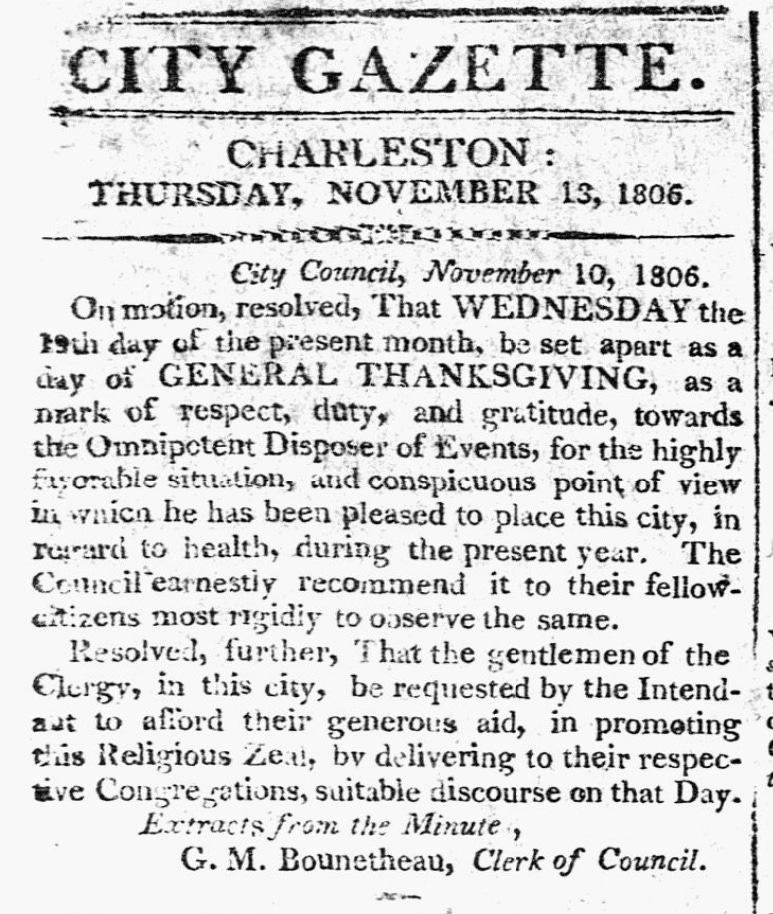
In these early years, days of thanksgiving were proclaimed in reaction to events that occurred throughout the year, and the holiday(s) were not on the same day each year. This custom began to change after the formation of the Federal Government of the United States in 1789. President George Washington and the ensuing American presidents began to establish days of thanksgiving in the autumn months, to reflect the “the New England tradition of an annual harvest celebration.”
It was President Abraham Lincoln who brought the holiday to the national forefront. On October 3, 1863, Lincoln issued a proclamation in the midst of the Civil War declaring the last Thursday of November as a National Day of Thanksgiving. Lincoln proclaimed:
“I do therefore invite my fellow citizens in every part of the United States, and also those who are at sea and those who are sojourning in foreign lands, to set apart and observe the last Thursday of November next, as a day of Thanksgiving and Praise to our beneficent Father who dwelleth in the Heavens. And I recommend to them that while offering up the ascriptions justly due to Him for such singular deliverances and blessings, they do also, with humble penitence for our national perverseness and disobedience, commend to His tender care all those who have become widows, orphans, mourners or sufferers in the lamentable civil strife in which we are unavoidably engaged…”
Though at first, thanksgiving was not a “fixed” holiday. Each successive president would “proclaim anew” the thanksgiving tradition each year and a day would be chosen.
It was not until autumn of 1941 when President Franklin D. Roosevelt signed a law designating that the third Thursday in November would be a (fixed) national Thanksgiving holiday each year.
Here is FDR’s original Proclamation 2373 for the creation of a Thanksgiving Holiday:
“By the President of the United States of America
A ProclamationI, Franklin D. Roosevelt, President of the United States of America, do hereby designate Thursday, the twenty-third of November, 1939, as a day of general thanksgiving.
More than three centuries ago at the season of the gathering in of the harvest, the Pilgrims humbly paused in their work and gave thanks to God for the preservation of their community and for the abundant yield of the soil. A century and a half later, after the new Nation had been formed, and the charter of government, the Constitution of the Republic, had received the assent of the States, President Washington and his successors invited the people of the Nation to lay down their tasks one day in the year and give thanks for the blessings that had been granted them by Divine Providence. It is fitting that we should continue this hallowed custom and select a day in 1939 to be dedicated to reverent thoughts of thanksgiving.
Our Nation has gone steadily forward in the application of democratic processes to economic and social problems. We have faced the specters of business depression, of unemployment, and of widespread agricultural distress, and our positive efforts to alleviate these conditions have met with heartening results. We have also been permitted to see the fruition of measures which we have undertaken in the realms of health, social welfare, and the conservation of resources. As a Nation we are deeply grateful that in a world of turmoil we are at peace with all countries, and we especially rejoice in the strengthened bonds of our friendship with the other peoples of the Western Hemisphere.
Let us, on the day set aside for this purpose, give thanks to the Ruler of the Universe for the strength which He has vouchsafed us to carry on our daily labors and for the hope that lives within us of the coming of a day when peace and the productive activities of peace shall reign on every continent.”
Happy Thanksgiving to everyone! I hope you have a wonderful day with friends & family!
➳ Sources — Thanksgiving in South Carolina
Butler, Nic. Charleston County Public Library. “Thanksgiving in Early Charleston.” Charleston Time Machine, https://www.ccpl.org/charleston-time-machine/thanksgiving-early-charleston#:~:text=The%20earliest%20known%20%E2%80%9Cday%20of,the%20Ashley%20River%20in%201670. Accessed 19 Nov. 2024.
“Proclamation 2373—Thanksgiving Day.” The American Presidency Project, 3 Nov. 1949, https://www.presidency.ucsb.edu/documents/proclamation-2373-thanksgiving-day. Accessed 19 Nov. 2024.
“The History of Thanksgiving.” Walking Charleston, 1 Nov. 2017, https://www.walkingcharleston.com/blog/2017/11/1/the-history-of-thanksgiving. Accessed 19 Nov. 2024.
Young, Robin. “Charles Towne Landing: Where It All Began.” Only In Your State, https://www.onlyinyourstate.com/state-pride/south-carolina/charles-towne-landing-charleston-sc. Accessed 19 Nov. 2024.
I always want to improve my work. Answer the poll below to give me your review of today’s newsletter. I also welcome your suggestions for new content! Simply reply to this email with your ideas. Thank you!




